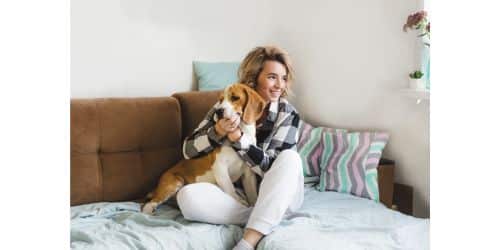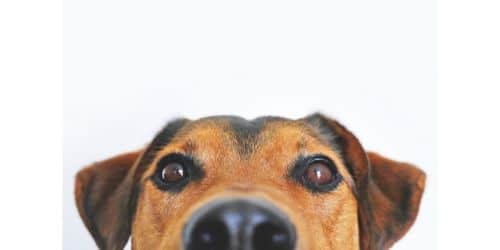Have you ever been puzzled as to why your cherished pet keeps sitting on you? It’s a behavior that many dog owners have observed, but they’re typically perplexed as to why. In this blog post, we’ll delve into the intriguing world of canine behavior and look at the top reasons why dog sit on their owners. So grab a cup of coffee, take a seat, and let’s solve the riddle together!
Why Does My Dog Sit on Me?
The following are the most common reasons why dogs sit on their owners:
#1. The Comfort Zone
Dogs are known to seek comfort, and where better to get it than from their human companions? Your lap, side, or even your chest becomes their particular haven. Your dog can feel secure, comfy, and close to you by sitting on you, relishing in the warmth of your presence.
The Bonding Factor
Dogs are sociable creatures, and sitting on their owners improves their bond. They are reaffirming their emotional connection with you as their trusted protector by physically bonding with you. This is their way of saying, “You are my haven, and I want to be close to you.”
Validation and Security
Dogs are creatures of habit, and sitting on you can bring a sense of validation and security to them. They are looking for your approval and are reassured by your physical presence. Sitting on you is a means for them to get your attention, affection, and the sense that they are safe.
#2. Territory and Ownership
Dogs have a natural need to mark their territory, and sitting on you can be one way for them to do so. They are expressing their authority and asserting their position in the pack hierarchy by claiming you as their own. “You belong to me!” they say.
Instinctive Guardianship
Dogs in the wild would protect their pack members, and this instinct can be transferred to domesticated dogs. Your dog may be expressing their desire to protect you by sitting on you. They see themselves as your devoted protector, keeping a close eye on their beloved human.
Seeking Security and Safety
Dogs are pack animals who seek safety and security by remaining close to their pack members. Your dog is seeking the same sense of security by sitting on you. They feel safe when they are close to a trusted human, and sitting on you provides that comfort.
#3. Seeking Attention and Affection
Dogs are social creatures who crave their owners’ attention. Sitting on you is an easy way for them to get your attention. A dog understands that if they sit on your lap or next to you, they will be petted, praised, and showered with affection. It’s a way for them to say, “Hey, look at me!”
Affection and Quality Time
When your dog sits on you, they are looking for attention and affection. Physical contact and the emotional connection it provides are essential for dogs. They invite you to interact with them, cuddle them, and show your love by sitting on you. They’re saying, “I want to be close to you and feel your love.”
Emotional Support and Companionship
Dogs are well-known for their ability to provide emotional support. Dog offers their companionship and emotional presence when they sit on you. They can detect when you are depressed or stressed, and their presence can provide solace and reassurance. It’s their way of saying, “I’m always here for you, no matter what.”
#4. Temperature and Coziness
Dogs are experts at finding comfort and warmth and sitting on you provides both. Your body heat, combined with the cozy surface you provide, creates an ideal environment for them to snuggle up. It’s their way of saying, “I love your warmth, and I want to share it with you.”
Heat Seekers
Chihuahuas, in particular, are known to be more sensitive to cold weather. Because of their small size and short fur, they are prone to becoming cold. As a result, when the dog sit on you, it is seeking the warmth and heat that your body provides. “Help me stay warm!” they say.
Cozy Nooks and Crannies
Your body has nooks and crannies that are ideal for napping. Dogs enjoy the contours and curves of your body because they feel safe and secure in them. They can find the perfect snuggling spot by sitting on you, ensuring a peaceful and restful nap.
#5. Separation Anxiety and Stress Relief
Dogs are social animals that can suffer from separation anxiety if they are separated from their owners. Sitting on you may be a coping mechanism for them to relieve anxiety. Your presence gives them a sense of security and comfort, lowering their stress levels and putting them at ease.
Stress Management and Emotional Support
Dogs, like humans, can suffer from stress and emotional turmoil. Sitting on you can serve as a stress relief strategy for them. Your physical presence and contact release feel-good hormones, such as oxytocin, which can help calm their nerves and provide emotional support through hard moments.
Counteracting Boredom
Dogs may resort to sitting on their owners out of boredom. If they lack mental stimulation or physical exercise, sitting on you can be a way for them to seek attention and ease their boredom. It’s crucial to ensure that your dog receives appropriate mental and physical stimulation to prevent boredom-related behaviors.
#6. Curiosity and Observing Their World
When your dog sit on you, they are often seeking a vantage point to observe their surroundings. Your lap or elevated position allows them to have a better view of their environment, satisfying their curiosity. It’s their way of saying, “I want to see what’s going on around me!”
People-Watching and Socializing
Dogs are social creatures and enjoy observing people and other animals. By sitting on you, they can enjoy a good place for people-watching or socializing with visitors. It allows them to be part of the social interactions and satisfy their need for socialization.
Keeping an Eye on You
Dogs are highly observant and responsive to their owner’s movements and feelings. By sitting on you, they can attentively monitor your actions, ensuring that they don’t miss out on any signs or signals you may be offering. It’s their way of expressing, “I’m keeping a watchful eye on you!”
#7. Mimicking Your Behavior and Habits
Dogs are recognized for their capacity to mimic human behavior, and sitting on you may be a way for them to copy your activities. If you routinely sit on the couch or a specific chair, your dog may want to join you and emulate your behavior. It’s their way of saying, “I want to be like you!”
Bonding Through Imitation
Imitating your behavior might deepen the bond between you and your dog. When the dog sit on you, they may be mirroring your actions as a way to connect with you on a deeper level. It’s their way of saying, “We are in sync, and I want to be close to you.”
Comfort in Familiarity
Your scent, warmth, and presence make you familiar and reassuring to your dog. By sitting on you, they may surround themselves with your scent and revel in the familiarity. It provides them with a sense of security and contentment, knowing that they are close to their beloved human.
#8. Attention-Seeking Behavior and Reinforcement
If your dog has received attention or affection in the past when sitting on you, they may have correlated this behavior with positive reinforcement. This can lead to their repeating the behavior to earn the same incentives. Dogs are bright creatures and rapidly learn, which gives them attention and affection.
Training and Boundaries
It’s crucial to establish limits and train your dog to recognize when sitting on you is appropriate and when it’s not. Consistent training and positive reinforcement can assist in influencing their behavior and guarantee that they sit on you when encouraged or permitted to do so.
Redirecting Attention-Seeking Behavior
If your dog’s sitting habit becomes excessive or bothersome, it may be important to redirect their attention to more acceptable activities. Engaging them in interactive play, providing puzzle toys, or supplying mental stimulation might assist in moving their focus away from sitting on you and onto other rewarding activities.
#9. Breed-Specific Traits and Temperament
Certain dog breeds may be more inclined to sit on their owners due to their breed-specific features and temperaments. For example, lap dog species like Chihuahuas, Pomeranians, or Cavalier King Charles Spaniels are recognized for their propensity for sitting on their owners. Understanding breed patterns might shed light on your dog’s behavior.
Size and Physical Proximity
Smaller dog breeds, such as Chihuahuas, may have an easier time sitting on their owners due to their size. They can fit on laps or find comfy locations on their owners’ bodies. Physical proximity is more manageable with smaller dogs, making sitting on their owners a convenient and favored alternative.
Temperament and Affectionate Nature
Some dogs are simply more affectionate and people-oriented than others. They need connection and adore sitting on their owners to show their love and affection. These canines thrive on human interaction and flourish when they are near their loved ones.
Health Benefits of Sitting on You
Believe it or not, there are certain health benefits linked to your dog sitting on you. Physical contact and closeness can assist you and your pet in reducing stress and lowering blood pressure. The “feel-good” hormone oxytocin can improve relaxation and overall well-being.
Seeking Comfort During Illness
When you’re sick or feeling under the weather, your dog may automatically sense this and choose to sit on you. They’re extending their support and comfort throughout your time of need. Their presence can have a relaxing and healing impact, both physically and mentally.
Considerations for Older Dogs or Dogs with Health Issues
While sitting on you might be a gesture of affection and camaraderie, consider the physical limitations of older dogs or those with health difficulties. If your dog has joint problems, arthritis, or mobility issues, sitting on you may cause discomfort or aggravate their condition. In such instances, providing your dog with alternate, comfortable resting areas is critical.
Consulting a Veterinarian
If your dog’s sitting behavior is extreme, compulsive, or accompanied by other troubling signs, you should see a veterinarian. They can assist in determining whether any underlying medical or behavioral disorders are contributing to the behavior. An expert perspective can provide vital insights and advice customized to your dog’s requirements.
Is it a sign of dominance or affection?
Sitting on you is often more suggestive of affection and wanting comfort than of power. Dogs have a natural need to be close to and physically touch their human partners. When your dog sit on you, it is frequently a sign of their desire for emotional connection, security, and warmth.
How can I stop my dog from sitting on me?
If you want to discourage your dog from sitting on you, here are some strategies you can try:
- Provide an alternative comfortable spot
- Use positive reinforcement
- Establish boundaries
- Ignore the behavior
- Provide mental and physical stimulation
- Seek professional guidance
What does it mean when your dog sits on you?
Your dog might sit in your lap to show affection.
They may believe you are asking them to play. Sitting on you may also help them feel safe since they see you as their guardian. You are their “safe spot.” Similarly, although on a sadder note, they may be suffering from separation anxiety.
Why do dogs sit in your spot when you get up?
The dog feels at ease by settling into a cushion you last occupied, which most likely contains your scent. They may also wish to “protect” your home against intruders such as houseguests. It’s a strong display of affection and a powerful demonstration of the link dogs can have with their caregivers.
How do you know if your dog is imprinted on you?
Signs Your Dog Has Made an Impression On You:
- They keep a careful eye on you.
- They mimic your actions.
- When they are in unfamiliar locations or circumstances, they constantly check in with you.
- They are more likely to obey your directions than those of others.
- They are always looking for your company and attention.
Why does my dog follow me to the bathroom?
Dogs who accompany you to the bathroom
Because you are the one who meets the majority of their requirements, including those for affection, the following is a symptom of this devotion. They may also be anticipating routines they enjoy, such as a walk or dinner.
Conclusion
The act of your dog sitting on you is motivated by a variety of factors, all of which are rooted in their instincts, emotional needs, and the special bond you share. Dogs choose you as their warm perch for a variety of reasons, ranging from seeking comfort and security to displaying affection and attention-seeking behavior.
Understanding the causes of this behavior allows you to connect with your pet more deeply and enhance your bond. You may develop a happy connection where sitting on you becomes a cherished time of shared warmth and affection by providing a safe and loving environment, setting limits, and ensuring their physical and emotional needs are satisfied.
So the next time your dog curls up on your lap, remember that it’s their way of saying “I love you” and asking for your love and friendship in return. Accept the joy and comfort they bring, and treasure these rare moments of canine-human connection. After all, a dog’s love and loyalty are one of life’s greatest blessings.
Related Articles
- Home Remedies For Dog Scooting
- How To Boil Chicken For Dogs: Detailed Guide
- Allergic Conjunctivitis In Dogs: Causes, Symptoms, and Treatment
- 21 Worst Dog Food Brands To Avoid In 2023
- 7 Best Low Protein Dog Food In 2023 (+Recipes)
- Are Dogs Gay?
- Should I Put My Dog Down with Vestibular Disease?






